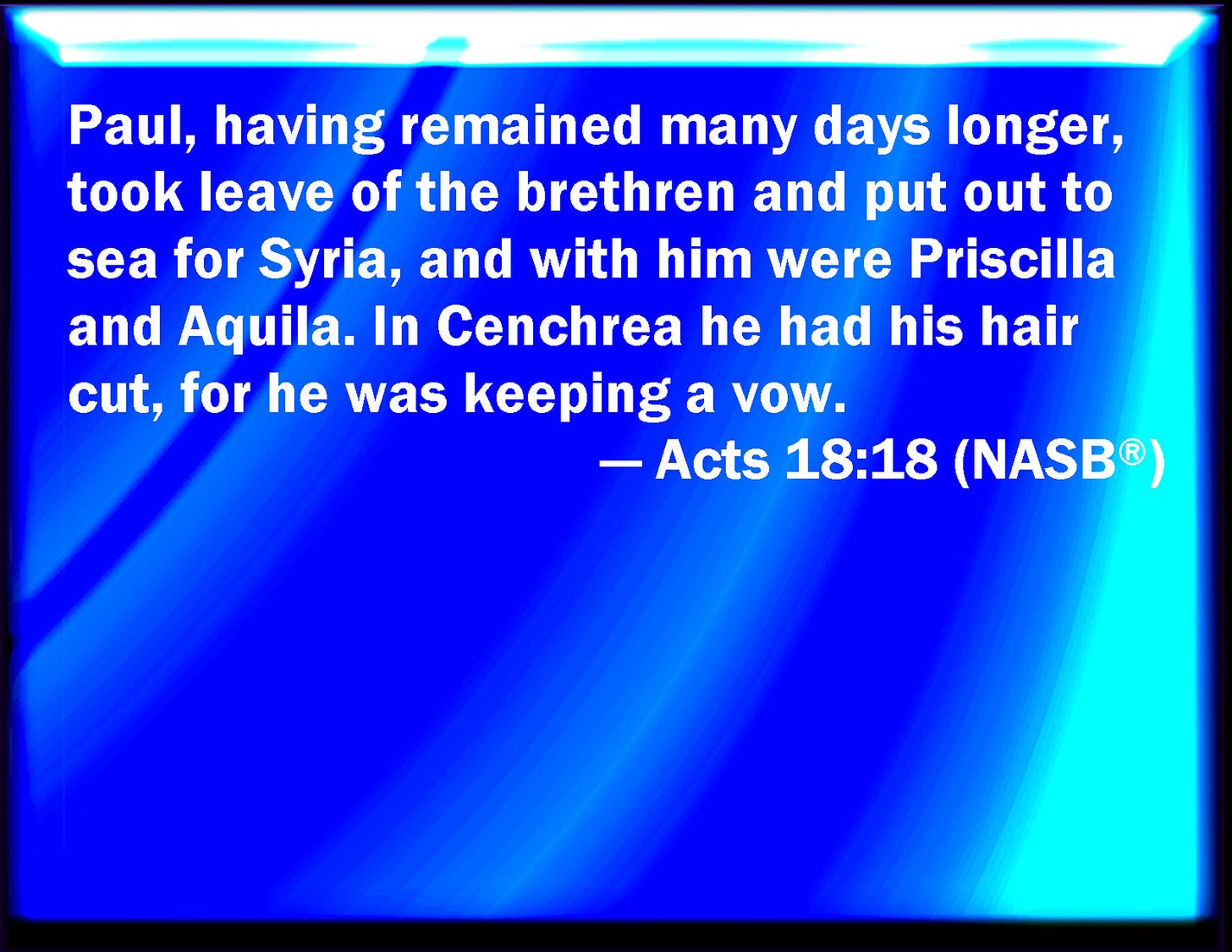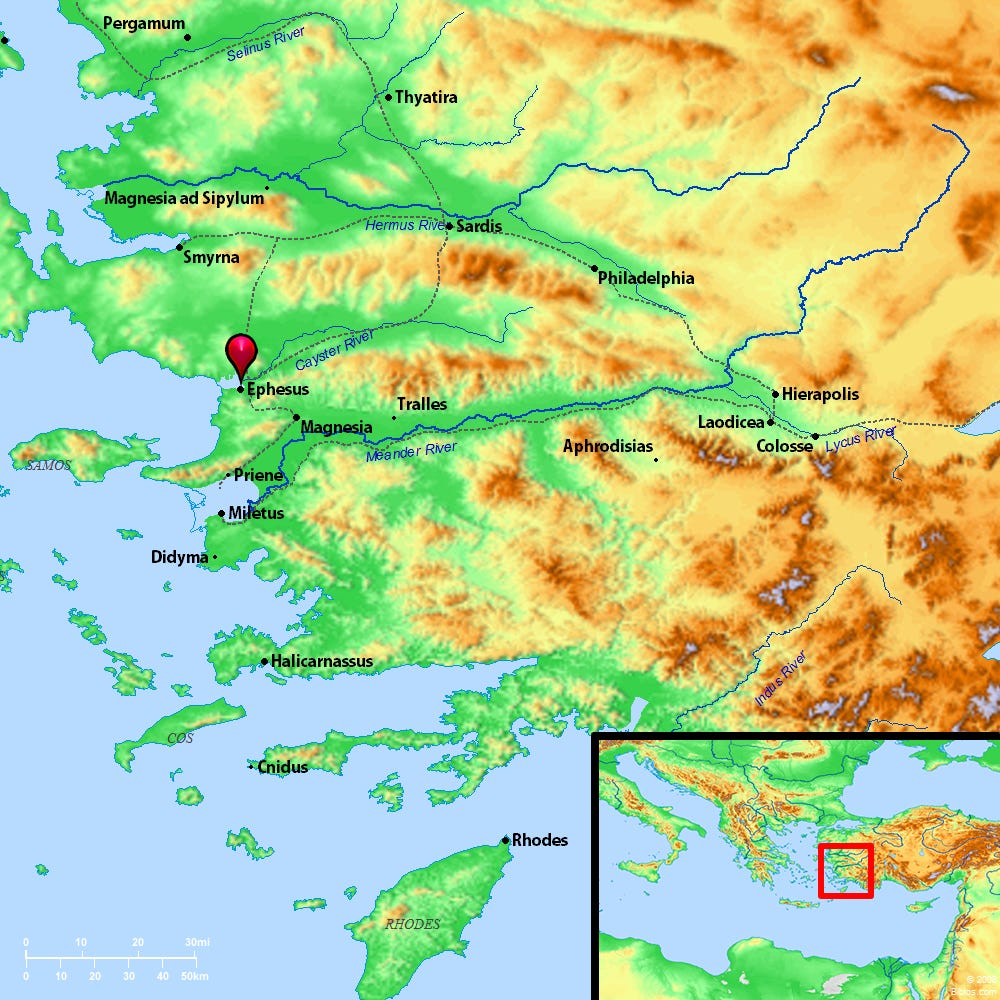A Study of Acts: Paul Returns to Syria
Acts 18:18-22 - While Gentiles don’t have comply with Mosiac Law to be believers, converted Jews like Paul would often honor their religious roots.
“Paul, having remained many days longer, took leave of the brethren and put out to sea for Syria, and with him were Priscilla and Aquila. In Cenchrea he had his hair cut, for he was keeping a vow. They came to Ephesus, and he left them there. Now he himself entered the synagogue and reasoned with the Jews. When they asked him to stay for a longer time, he did not consent, but taking leave of them and saying, “I will return to you again if God wills,” he set sail from Ephesus. When he had landed at Caesarea, he went up and greeted the church, and went down to Antioch.”
Acts 18:18-22 NASB1995
Paul finally leaves Corinth and brings Priscilla and Aquila with him; he is intending to head home to the church at Antioch. Before he boards a ship at Cenchrea, he has his hair cut, for he was keeping a vow. First, where is Cenchrea? Here’s a map from Bibleastlas.org showing this port located just east of Corinth:
So what is this vow that Paul had taken? Why would he fulfill the requirements of a vow now, after telling more people than you can count that we are saved by faith alone in Christ alone and rituals and vows are not needed for salvation? Well, I like this explanation from Enduring Word:
He had his hair cut off at Cenchrea, for he had taken a vow: The vow was almost certainly the vow of a Nazirite (Numbers 6). Usually this vow was taken for a certain period of time and when completed, the hair (which had been allowed to freely grow) was cut off and offered to the Lord at a special ceremony at the temple in Jerusalem.
The purpose of the vow of a Nazirite was to express a unique consecration to God, promising to abstain from all products from the grapevine, to not cut one’s hair, and to never come near a dead body.
Paul’s performance of this vow shows that Jewish opposition to his preaching had not made him anti-Jewish. He never forgot that he was Jewish, His Messiah was Jewish, that Christianity is Jewish, and that Old Testament forms and rituals might still be used to good purpose. Apparently, though Paul was adamant that Jewish ceremonies and rituals must not be required of Gentiles, he saw nothing wrong with Jewish believers who wished to observe such ceremonies, presumably if their fulfillment in Jesus was also recognized.
William Barclay suggests that Paul’s motive was gratitude. “No doubt Paul was thinking of all God’s goodness to him in Corinth and took this vow to show his gratitude.” But the purpose of a Nazirite vow seems to be more of consecration than thanksgiving. Perhaps the intense worldliness of Corinth made Paul want to express his dedication and separation unto the Lord more than ever.
By tradition, a Nazirite vow could only be fulfilled in Judea. Paul began this vow at Cenchrea, not in Judea. Paul’s adoption of the vow out of the bounds dictated by Jewish tradition could indicate a desire to practice a more purely Biblical observance of Jewish rituals.
I think this is a good explanation for Paul’s vow fulfillment. He still had his Jewish roots and honored them. John the Baptist was a notable Nazarite. For us as Christians, sanctification doesn’t stop with our justification, unless that salvation happens on your death bed. As faith grows, we grow in service to the Lord in many ways: Worship, giving, intercessory prayer, helping others, serving on mission teams, doing Bible studies, being baptized, taking Communion, and even reciting those liturgies and creeds that are popular in certain denominations. Actions that move us away from continued sin patterns should also become engrained in our lives.
Paul sails from Cenchrea with Priscilla and Aquila to Ephesus:
He leaves his friends in that city, although he does enter a synagogue to reason with the Jews. They want to hear more from him, but he tells them he will be back if God wills it (we will hear much more about Ephesus during his third Missionary journey). He sails from Ephesus to Caesarea, stops in Jerusalem to greet the church and then journeys north to Antioch. According to scholars, it is now about AD 52 or 53. The total distance from Corinth to Caesarea by sea is about 800 miles, including the stop in Ephesus.
My next devotional examines Acts 18: 23-28 - The third Missionary journey begins for Paul and a new proclaimer of faith (Apollos) emerges in Ephesus.
Heaven on Wheels Daily Prayer:
Dear Lord: Thank you for the details that Luke provides about Paul’s journeys. This makes the book of Acts even more real to readers. Amen.
Scripture quotations taken from the (NASB®) New American Standard Bible®, Copyright © 1960, 1971, 1977, 1995 by The Lockman Foundation. Used by permission. All rights reserved. lockman.org
Bibleatlas.org was accessed on 12/16/2024 to review maps for Cenchrea and Ephesus.
Enduring Word commentary by David Guzik is used with written permission.





